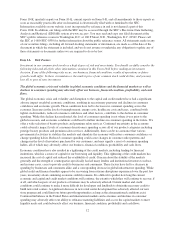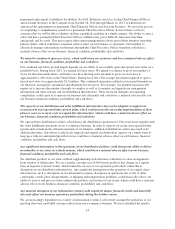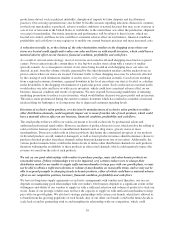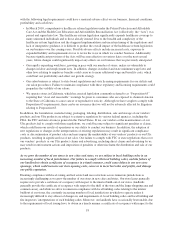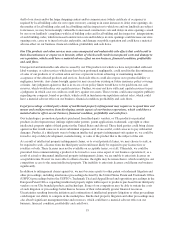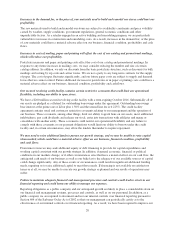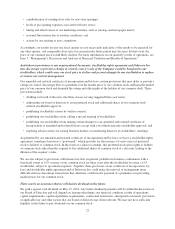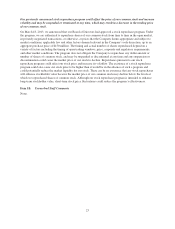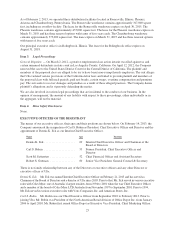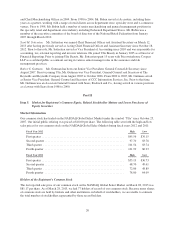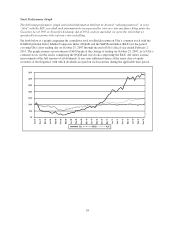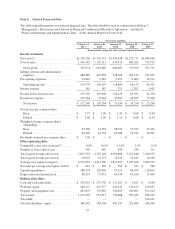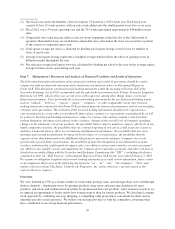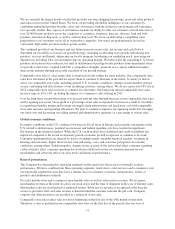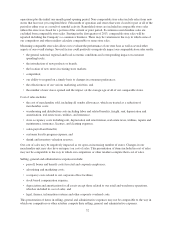Ulta 2012 Annual Report Download - page 26
Download and view the complete annual report
Please find page 26 of the 2012 Ulta annual report below. You can navigate through the pages in the report by either clicking on the pages listed below, or by using the keyword search tool below to find specific information within the annual report.‰cannibalization of existing store sales by new store openings;
‰levels of pre-opening expenses associated with new stores;
‰timing and effectiveness of our marketing activities, such as catalogs and newspaper inserts;
‰seasonal fluctuations due to weather conditions; and
‰actions by our existing or new competitors.
Accordingly, our results for any one fiscal quarter are not necessarily indicative of the results to be expected for
any other quarter, and comparable store sales for any particular future period may decrease. In that event, the
price of our common stock would likely decline. For more information on our quarterly results of operations, see
Item 7, “Management’s Discussion and Analysis of Financial Condition and Results of Operations.”
Anti-takeover provisions in our organizational documents, stockholder rights agreement and Delaware law
may discourage or prevent a change in control, even if a sale of the Company would be beneficial to our
stockholders, which could cause our stock price to decline and prevent attempts by our stockholders to replace
or remove our current management.
Our amended and restated certificate of incorporation and by-laws contain provisions that may delay or prevent a
change in control, discourage bids at a premium over the market price of our common stock and harm the market
price of our common stock and diminish the voting and other rights of the holders of our common stock. These
provisions include:
‰dividing our board of directors into three classes serving staggered three-year terms;
‰authorizing our board of directors to issue preferred stock and additional shares of our common stock
without stockholder approval;
‰prohibiting stockholder actions by written consent;
‰prohibiting our stockholders from calling a special meeting of stockholders;
‰prohibiting our stockholders from making certain changes to our amended and restated certificate of
incorporation or amended and restated bylaws except with a two-thirds majority stockholder approval; and
‰requiring advance notice for raising business matters or nominating directors at stockholders’ meetings.
As permitted by our amended and restated certificate of incorporation and by-laws, we have a stockholder rights
agreement, sometimes known as a “poison pill,” which provides for the issuance of a new series of preferred
stock to holders of common stock. In the event of a takeover attempt, this preferred stock gives rights to holders
of common stock other than the acquirer to buy additional shares of common stock at a discount, leading to the
dilution of the acquirer’s stake.
We are also subject to provisions of Delaware law that, in general, prohibit any business combination with a
beneficial owner of 15% or more of our common stock for three years after the stockholder becomes a 15%
stockholder, subject to specified exceptions. Together, these provisions of our certificate of incorporation, by-
laws and stockholder rights agreement and of Delaware law could make the removal of management more
difficult and may discourage transactions that otherwise could involve payment of a premium over prevailing
market prices for our common stock.
There can be no assurance that we will declare dividends in the future.
We paid a special cash dividend on May 15, 2012. Any future dividend payments will be within the discretion of
our Board of Directors and will depend on, among other things, our financial condition, results of operations,
capital requirements, capital expenditure requirements, contractual restrictions, anticipated cash needs, provisions
of applicable law and other factors that our board of directors may deem relevant. We may not have sufficient
liquidity in the future to pay dividends on our common stock.
22


